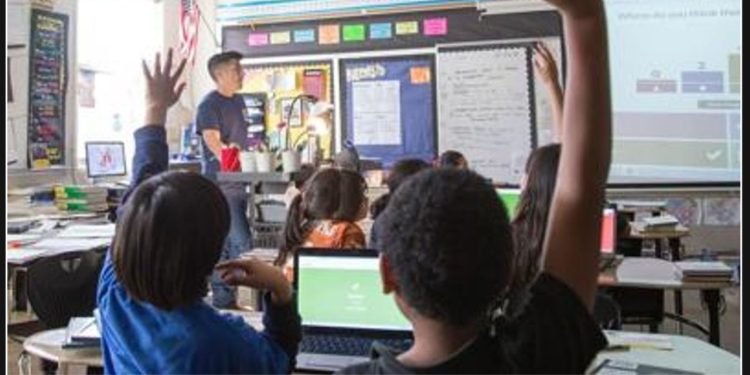The Texas Education Agency’s (TEA) proposal for Texas’ state-owned textbooks, known as Bluebonnet Learning, was approved by the State Board of Education (SBOE) on Friday.
The vote passed by a narrow margin of 8-7, resulting in the approval of several new educational initiatives. These initiatives encompass a fresh Mathematics curriculum for students from Kindergarten to 8th grade, as well as updated Language Arts material for students in grades K-5. Furthermore, teachers will benefit from additional instructional support to enhance their teaching methods.
Governor Greg Abbott expressed his praise for the vote, stating, “The approval of Bluebonnet Learning marks an important milestone in our efforts to prioritize fundamental education and deliver the highest quality of education in the country.”
The materials, as highlighted by the author, are offered voluntarily and without any cost. Parents and the general public have the opportunity to freely access these materials on the website tea.texas.gov/bluebonnet.
Governor Abbott expressed his belief that the transformative educational materials will play a critical role in providing young Texans with access to high-quality, grade-level appropriate curricula. He emphasized that these materials will focus on essential subjects such as math, reading, science, and other core subjects, with the aim of enhancing student outcomes across the state of Texas.
In 2023, state Representative Brad Buckley, R-Killeen, introduced HB 1605, which has since become law under Governor Abbott’s signature. This legislation mandates the Texas Education Agency (TEA) to offer Open Education Resources (OER) textbooks for essential subjects like reading and math in Pre-K to 8th grade. Additionally, the TEA is responsible for establishing an advisory board to guarantee the materials meet high standards and align with state requirements. The approval of these materials falls under the jurisdiction of the State Board of Education (SBOE).
School districts have the option to voluntarily adopt the curriculum, and if they choose to do so, they will receive extra funding. In the case of using Bluebonnet Learning, an additional stream of funding will be provided to help cover the expenses related to printing.
According to The Center Square, Abbott emphasized in May that the materials would offer a solid foundation in core subjects such as math, reading, and science. He also highlighted their ability to help students grasp the significance of history, art, community, literature, and religion in key events like the signing of the U.S. Constitution, the Civil Rights Movement, and the American Revolution.
Opponents of the proposed curriculum in the Language Arts material have raised several concerns, with a key focus on the inclusion of Christianity and the Bible.
The American Federation of Teachers-Texas Chapter also criticized the selective allocation of additional state funding to only those school districts that choose to participate, claiming that this approach is unethical and goes against educational standards.
According to AFT-Texas Chapter President Zeph Capo, every educator in the state of Texas is required to adhere to a Code of Ethics. One of the standards outlined in this code is the prohibition of excluding students from participation in a program, denying them benefits, or granting advantages based on factors such as race, color, gender, disability, national origin, religion, family status, or sexual orientation.
Texas has a knack for making us break this rule, especially when the Legislature wraps up its session and the governor signs off on numerous harmful bills. However, this time, it is the State Board of Education that has pushed us to go against our Code of Ethics once again.
“On November 22, the SBOE approved Bluebonnet Learning materials as curriculum resources for Texas public school districts. The vote was close and crossed party lines, with only a last-minute political appointee making the decisive difference.”
According to Capo, the materials not only lack appropriateness, but they also fail to fulfill their intended purpose. Experts in instructional methods have raised serious concerns about the suitability of these materials for different age groups and their effectiveness in promoting reading skills.
The board conducted the vote following extensive public input. Over 150 individuals registered to testify before the board regarding the curriculum, showcasing the high level of public engagement. On Tuesday, the board members took a preliminary vote, with a narrow margin of 8-7, signifying sufficient support for the adoption of the curriculum. It is worth noting that thousands of people expressed their opinions after the material was released to the public in May.
The Texas Education Agency (TEA) initiated a three-month public feedback period in May 2024 to allow the public to review and provide comments on the proposed materials. Additionally, the SBOE held a meeting in September where they welcomed several hours of public testimony, allowing for further feedback on the product. The TEA carefully considered and utilized these comments and feedback to make necessary refinements, edits, and preparations for the final submission of the materials as part of the SBOE’s Instructional Materials Review and Approval (IMRA) process. This process ensures that the materials are in line with state standards and values.
Bluebonnet Learning started its branding process based on valuable input from teachers and parents who were looking for a recognizable and unique name for their educational materials. The goal was to make it easier for educators and school systems to identify these resources. It’s important to note that Bluebonnet Learning materials are classified as Texas Open Education Resources (OER). This means that they are owned by the state, freely accessible to everyone, and can be modified as needed to enhance their quality for both students and teachers.
